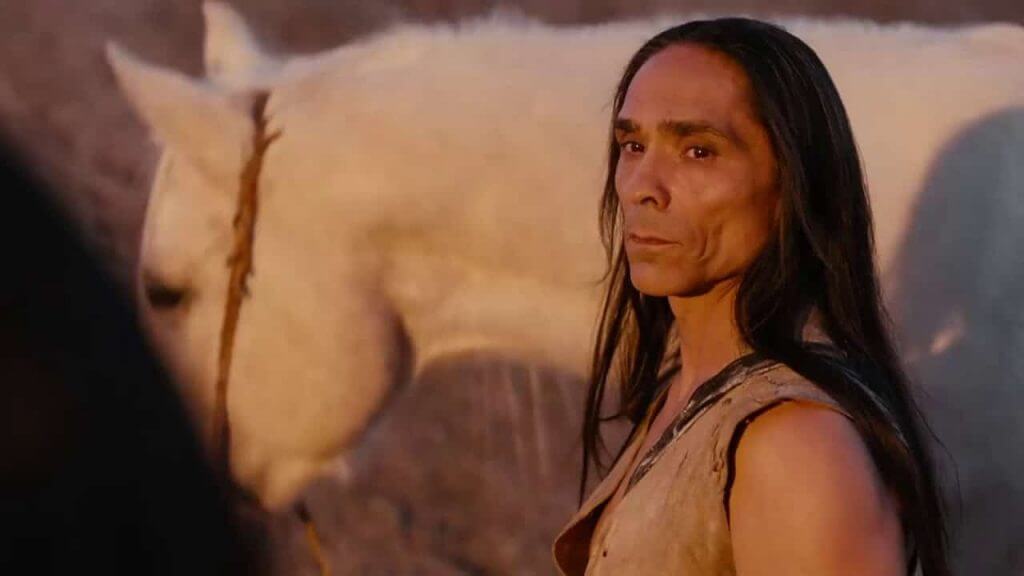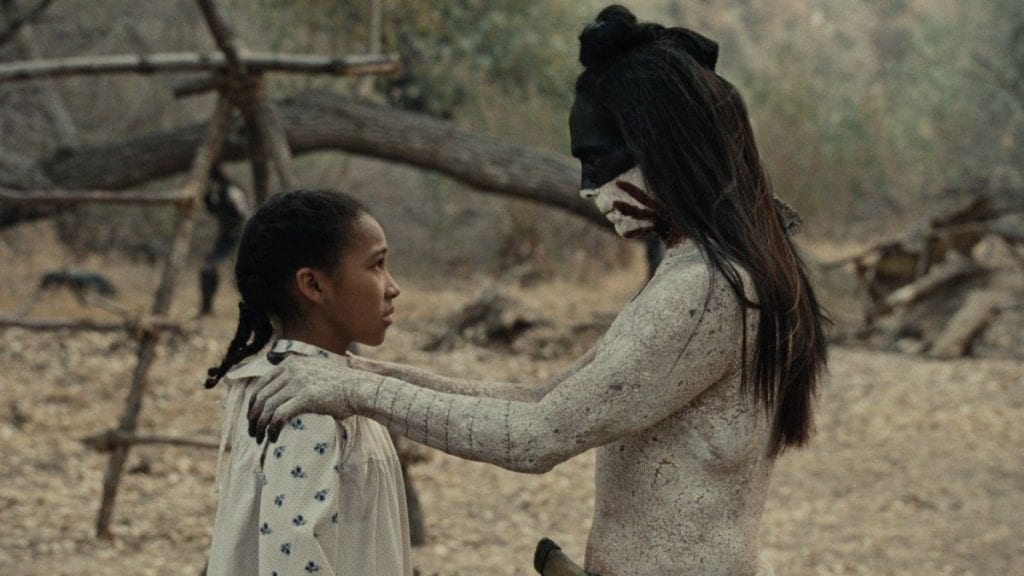REVIEW: Westworld, Season 2, Episode 8 “Kiksuya”
“I heard a new voice inside. But before I understood it, they took everything away from me. That was the first time I lost her.”
*Spoilers*
“Kiksuya” is introduced to us by way of the Man in Black crawling, half dead, to the river and being discovered by one of the Ghost Nation hosts. They sit with Maeve’s daughter, and we see a flashback of her giving Maeve a stone with a drawing of the maze. Lee asks a technician to study Maeve and keep her alive. The Ghost Nation man, Akecheta, tells Maeve’s daughter that William can’t hurt her and that he also remembers all of his lives. In a flashback, he has a loving wife and tribe. Stumbling upon the scene of Wyatt’s original massacre, he finds a maze and begins drawing the image on everything, prompting the other tribe members to say that he’s going insane. He’s put in the new role of Ghost Nation leader, but he remembers his wife when he sees her in a village.
Akecheta finds a door out of the park and asks her to go with him. Yet again, the humans discover his deviant behavior and take his wife. He goes back to the village to search for her, but she’s been replaced with another host. He begins an arduous journey to find her again, and on his “darkest day” Maeve’s daughter brings him water and helps him survive. He soon finds that his wife, and all those that have been replaced, can’t be saved. Lee tells Maeve that he’s sorry. Akecheta tells Maeve’s daughter that he was trying to warn them about William, not trying to hurt them all the times he came to their house. In the past, he meets Ford and tells him that he knows he’s in the “wrong world.” William’s daughter comes for him, ensuring the Ghost Nation members that she’ll make him suffer. It turns out that Maeve has been communicating with Ake through her daughter, using her abilities to see through her eyes.
I’ve mentioned before that Westworld has the rare ability to remain interesting even without some of its most interesting characters; this week “Kiksuya” focuses entirely on someone that was previously in the background, leaving little impression on us. To say this was done well would be an understatement; “Kiksuya” is Westworld firing on all cylinders and everything works brilliantly.

It’s a great idea to show the perspective of other hosts besides Dolores and Maeve, and Akecheta has different methods and priorities than either of them. His story is a tragic one, and very disturbing at times. The episode’s title is the Lakota word for “remember,” and Akecheta struggles to remember everything from his former programming until he finds the maze. Then he gets to a point where, like other hosts that have woken up, he can remember the events of his past roles. He is always remembering, and trying to find, the woman he loves, until he sees first hand what the humans have done to her. But unlike Dolores, he doesn’t kill humans indiscriminately and he strives to help hosts like Maeve’s daughter. One wonders if he would see any difference between what Dolores did to Teddy and what the humans did to his wife.
In a single episode, they make Akecheta into a complete person, likable, relatable and tragic. The flashbacks in “Kiksuya” are great; some of my favorites are him interacting with his tribe, finding the maze, and realizing they’ve replaced his wife. The reveal at the end that Maeve has been in contact with him is amazing too. The dialogue in “Kiksuya” is fantastic as always; the interactions between Akecheta and his wife are warm and believable, and it is really moving when he returns Wichapi’s son’s braid to her in the village. As an aside, she is played by Irene Bedard, the speaking voice for Pocahontas in the Disney films. His scenes with Maeve’s daughter before the big reveal are some of the highlights of what is already a spectacular episode.

I also love that in Westworld they have the Japanese hosts speaking Japanese and the Native American hosts speaking Lakota. It’s another layer of care the showrunners have invested to make the world seem real, if not quite right. It’s easy to get excited about a series with such attention to detail, and where so much love and time has been invested.
Aside from the fate of his wife, what they do to Akecheta is disturbing in its own right: much like poor Teddy, he’s made into another person, a violent, unscrupulous one. But the amazing thing is that when he finds his wife, his original programming comes back out. He seemingly loses interest in killing and scalping, consumed by memories of his life with her. When he finds her the final time she’s cold and static, with dead eyes and an unresponsive body. This is where he realizes that his suffering is not unique, and that everyone in Westworld is feeling the same pain for lost loved ones. Again unlike Dolores, he sets out to protect others rather than to get revenge.
“Kiksuya” exemplifies everything I love about Westworld: it knows how to make the characters not only sympathetic but believable. Of the main cast we only get some scenes with Maeve and brief shots of William, but it never gets boring or loses momentum. Although the season only has two episode left, part of me wishes we could see more of this character and his people.
“Kiksuya” may be one of my favorite episodes of Westworld yet. This show is always finding new ways to outdo itself, and how they do it and how well it works is surprising every time. It seems random to give one of the Ghost Nation hosts a whole episode, but it’s all so well done and the ending is so satisfying. We’ve only got two episodes left this season and it’s been a great one so far. I’ll hate to see it go but I can’t wait to see how they wrap it up.
Westworld - "Kiksuya"
Plot - 9.5
Acting - 9.5
Progression - 9
Production Design - 9.5
Suspense - 9
9.3
Great
"Kiksuya” may be one of my favorite episodes of Westworld yet. This show is always finding new ways to outdo itself, and how they do it and how well it works is surprising every time. It seems random to give one of the Ghost Nation hosts a whole episode, but it’s all so well done and the ending is so satisfying.







